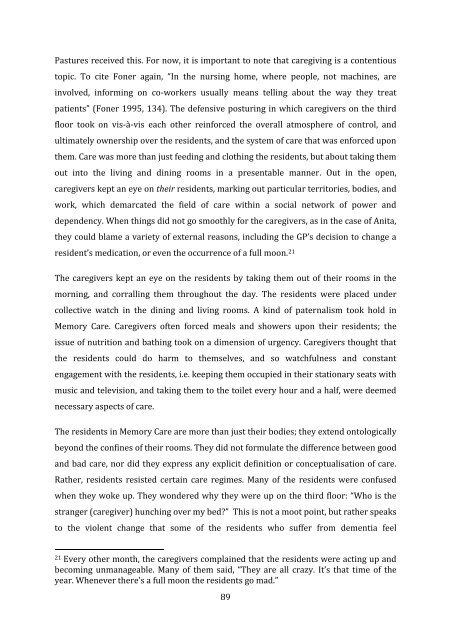Philip Y. Kao PhD thesis - Research@StAndrews:FullText
Philip Y. Kao PhD thesis - Research@StAndrews:FullText
Philip Y. Kao PhD thesis - Research@StAndrews:FullText
Create successful ePaper yourself
Turn your PDF publications into a flip-book with our unique Google optimized e-Paper software.
Pastures received this. For now, it is important to note that caregiving is a contentious<br />
topic. To cite Foner again, “In the nursing home, where people, not machines, are<br />
involved, informing on co-workers usually means telling about the way they treat<br />
patients” (Foner 1995, 134). The defensive posturing in which caregivers on the third<br />
floor took on vis-à-vis each other reinforced the overall atmosphere of control, and<br />
ultimately ownership over the residents, and the system of care that was enforced upon<br />
them. Care was more than just feeding and clothing the residents, but about taking them<br />
out into the living and dining rooms in a presentable manner. Out in the open,<br />
caregivers kept an eye on their residents, marking out particular territories, bodies, and<br />
work, which demarcated the field of care within a social network of power and<br />
dependency. When things did not go smoothly for the caregivers, as in the case of Anita,<br />
they could blame a variety of external reasons, including the GP’s decision to change a<br />
resident’s medication, or even the occurrence of a full moon. 21<br />
The caregivers kept an eye on the residents by taking them out of their rooms in the<br />
morning, and corralling them throughout the day. The residents were placed under<br />
collective watch in the dining and living rooms. A kind of paternalism took hold in<br />
Memory Care. Caregivers often forced meals and showers upon their residents; the<br />
issue of nutrition and bathing took on a dimension of urgency. Caregivers thought that<br />
the residents could do harm to themselves, and so watchfulness and constant<br />
engagement with the residents, i.e. keeping them occupied in their stationary seats with<br />
music and television, and taking them to the toilet every hour and a half, were deemed<br />
necessary aspects of care.<br />
The residents in Memory Care are more than just their bodies; they extend ontologically<br />
beyond the confines of their rooms. They did not formulate the difference between good<br />
and bad care, nor did they express any explicit definition or conceptualisation of care.<br />
Rather, residents resisted certain care regimes. Many of the residents were confused<br />
when they woke up. They wondered why they were up on the third floor: “Who is the<br />
stranger (caregiver) hunching over my bed?” This is not a moot point, but rather speaks<br />
to the violent change that some of the residents who suffer from dementia feel<br />
21 Every other month, the caregivers complained that the residents were acting up and<br />
becoming unmanageable. Many of them said, “They are all crazy. It’s that time of the<br />
year. Whenever there’s a full moon the residents go mad.”<br />
89
















